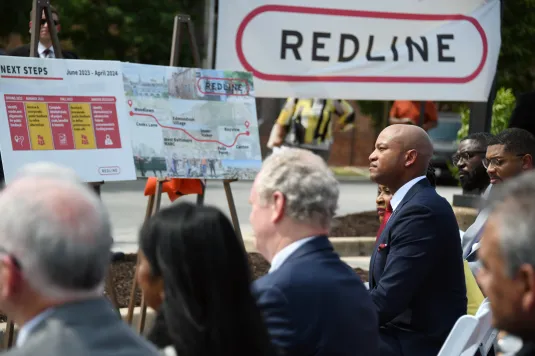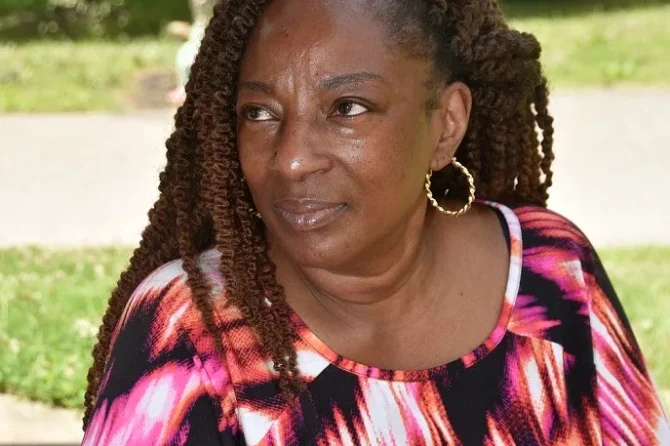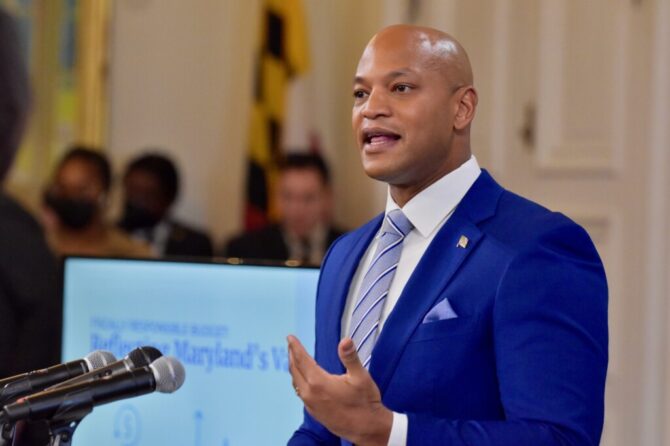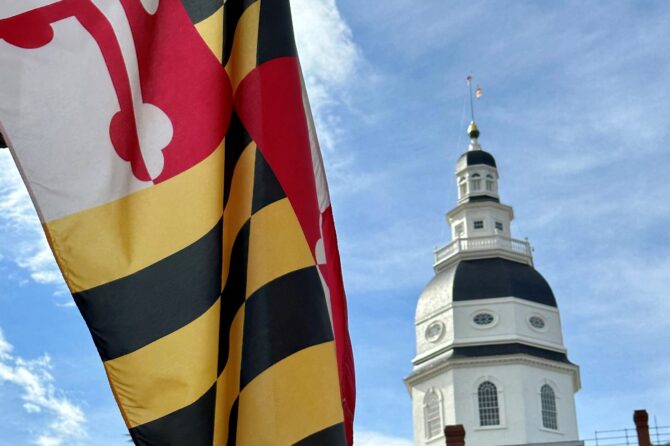BALTIMORE SUN: Maryland officials are aiming to resolve a multibillion-dollar hole in the state’s transportation portfolio by deferring plans for construction projects that haven’t started, making cuts across all transportation-related agencies and raising some fees.
The total reduction of $3.3 billion in planned spending over the next six years would limit future funding for services like roadway litter collection and commuter buses, delay the electrification of the state’s fleet of buses and put on hold hundreds of millions of dollars worth of highway and road projects, according to a plan released Tuesday by the Maryland Department of Transportation. Paul Wiedefeld, the department’s secretary, said in an interview the changes are necessary because officials are required to submit a balanced budget to lawmakers next month, when Gov. Wes Moore is scheduled to propose his entire 2025 fiscal year spending plan.
A six-year forecast of transportation projects released earlier this year estimated a $2.1 billion shortfall through the 2029 fiscal year. Revenue expectations, however, have continued to fall. Between expenses outpacing revenues, the drying up of pandemic-era federal funding, and rising financial pressures within the state’s transportation funding system, Wiedefeld said steps are being taken to solve what the department ultimately estimated as a $3.3 billion shortfall.
Lawmakers have started a two-year process of finding alternative revenues for the state’s transportation needs but the department “can’t assume some future revenue increase in the future,” Wiedefeld said. Managers in each agency within the department have been asked to cut 8% of their operating budgets, which will lead to limited services and pauses on some repairs, he said.
The Motor Vehicle Administration will implement a hiring freeze and reduce some of its hours of service. The Maryland Transit Administration will be forced to cut operations — targeting areas with fewer users, like commuter buses that have not rebounded in use after the pandemic, Wiedefeld said. A significant area of cuts will come from reducing highway maintenance and repairs. About 30% of funding for work that includes picking up highway trash, mowing grass, fixing guard rails and other “minor highway repairs” will be pulled, Wiedefeld said.
Additionally, funding for all projects that have not started or that will not be advertised for construction starting Jan. 1 will be pulled, Wiedefeld said. Those expansion projects — about $500 million of which are slated for highways — made the most sense to defer while ongoing projects dealing with safety and system preservation are kept a priority, he said. Wiedefeld said the projects being deferred are not necessarily permanently shuttered.
Projects that have already received federal funds or other grants will not be affected. That includes the Frederick Douglass Tunnel project, which is replacing a 4-mile section of Amtrak’s Northeast Corridor. The Red Line, an east-west transit project in Baltimore that is in the planning process and is a top priority for Moore, is also unaffected, as funding has not been committed yet.
“If you look at the history of the department, there’s a lot of projects that at a certain stage you’re thinking, ‘There’s no way we’re ever building this.’ But yet, as time marches on, revenues change, projects change, things evolve,” Wiedefeld said. On the revenue side, motor vehicle administration fees and airport parking fees will both be raised, generating about $80 million more per year, Wiedefeld said.
The department will also propose pausing a scheduled increase in revenue going to local governments for road projects. That plan, which would require legislative approval, would keep a 15.6% share of highway user revenues going to local governments instead of about 18% to 20% that legislators approved for future years.
The largest share of locally allocated highway user revenues is for Baltimore City. Under the 2022 law increasing the local share, the city would collect $78 million and $108 million more in the 2025 and 2026 fiscal years, respectively, as its share of the statewide fund increased to 12.2% in 2026, according to a legislative fiscal analysis. The updated transportation plan argues for keeping the current funding level, saving $245 million.
“It’s not just the department that obviously is feeling some pain here,” Wiedefeld said.Some lawmakers — many of whom are Democrats who have pushed expansions in transportation funding — had started being briefed on the plans last week and have expressed frustration.
Sen. Cory McCray, a Baltimore Democrat who worked on the bill to increase the local highway revenues share, said the plans “would undermine the Baltimore Region’s economic recovery and economic growth for years to come.”
“The current proposal risks undoing that work and throws the MTA system back into the chaos of long delays, broken down vehicles, and unsafe, unreliable operations. Our transit system is the primary mode of transportation for a large number of residents — as they travel to school and work, get child care, and access to food. We simply cannot cancel Baltimore’s transit future for the second time in less than a decade.”
Democrats who chair the Maryland Transit Caucus, Sen. Karen Lewis Young, of Frederick County, and Del. Jared Solomon, of Montgomery County, said in a statement they were “extremely disappointed in the dramatic cuts,” including what they said was nearly $1 billion for transit, bicycle and pedestrian investments. Capital budget cuts, including changes to highway expansion funding, span the state, according to the plans.
They include $33.9 million for improvements on Interstate 795 in Baltimore County at the Dolfield Boulevard exchange, and $105.6 million for improvements to U.S. Route 15 around the city of Frederick.U.S. Rep. David Trone, a Montgomery County Democrat who represents Western Maryland and is a candidate in the race to succeed U.S. Sen. Ben Cardin, wrote in a letter to Wiedefeld that reducing funding for projects in his district that had plans to receive federal funds is “unacceptable, and inconsistent with the intent of the law.”
Moore, who is set to address a crowd of local and state elected officials at an annual conference Thursday, has warned about potential budget constraints across government as he and Democratic lawmakers who control both chambers of the Maryland General Assembly begin negotiations next month. Aside from the transportation shortfall, budget officials have estimated a roughly $400 million hole in other general funds for the next fiscal year. Without cuts or other sources of revenue, that figure grows to $1.8 billion in the 2028 fiscal year.
Anticipating the need for a long-term transportation funding solution — especially as gas tax revenues wane during the expected growth of electric vehicles — lawmakers established a commission to evaluate the transportation trust fund and make recommendations. An initial report from the commission is due by the end of the month, and it meets for the final time this year on Dec. 13. With final recommendations due Jan. 1, 2025, it’s unlikely lawmakers will pursue changes in the next annual 90-day session that begins Jan. 10.
Wiedefeld did not say what he believes would be the correct balance for changing revenue collection for the system. A longtime transportation official, he said the “traditional” method of raising the gas tax by a few cents is no longer sustainable. An 8-cent increase to the fuel tax, for instance, would raise about $250 million — enough only to cover Maryland’s $250 million share of the $750 million Washington Metro shortfall in 2025, he said.
“The scale of the issue, the growth of the system [and] the desire of the public for what the system can do are just far outpacing what the trust fund structurally can handle,” Wiedefeld said.
Senate President Bill Ferguson said before the release of the plans Tuesday that he wasn’t surprised with the cuts because of the shortfall previously announced and because of the “huge looming revenue problem” that’s been evident for years as state policy and consumers have shifted toward electric vehicles.
He said tough choices will have to be made, and “the sooner we can do that, the better.” Still, he said he does not anticipate passing laws for a new funding system this coming session because of the timeline of the Maryland Commission on Transportation Revenue and Infrastructure Needs, or TRAIN Commission.
“If we want to expand the system’s roads and bridges, transit systems, the port, the airport, we have to pay for it,” Ferguson, a Baltimore Democrat, said Tuesday.
“We’ve not had that hard conversation yet of, ‘Do we want to expand and, if so, how do we pay for it?’”While Moore has said he would like lawmakers to reevaluate the state’s annual automatic gas tax increases — it rose 5 cents, to 47 cents per gallon over the summer — Ferguson said that’s not a priority for him in the next year.
“No one likes paying the gas tax rate. But it’s a user fee, and it’s how we fund our transportation, our roads and our bridges and our transit systems. So, we’ve got to pay for it somehow,” he said.










